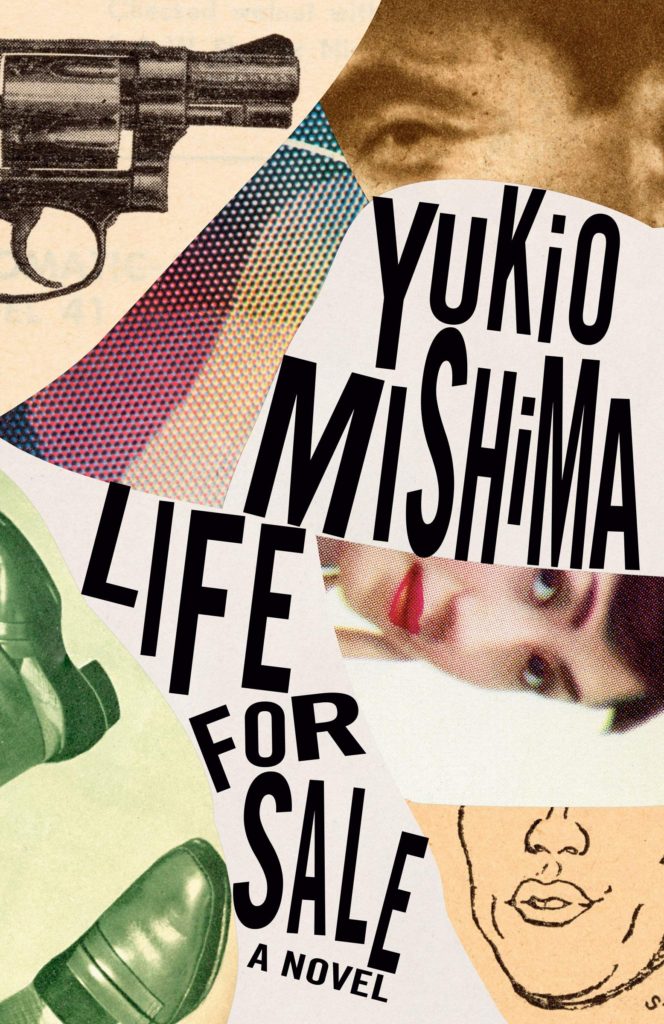
Motivated, no doubt, by Mishima’s rapidly ascending reputation in the West, publishers in Britain and the United States have finally translated his 1968 novel Life For Sale, bringing it to English-speaking audiences for the first time. It is just the third Mishima novel I have read, but each has been so unlike its predecessor in style and tone that I marvel at his range: The Sound Of Waves is a romance, set on an Edenic Japanese fishing island, while Confessions Of A Mask is a tightly-focused psychological drama, funny at times, but captivating in its overwhelming strangeness. Life For Sale is a parody, and if you knew nothing about Mishima or the post-WWII Japanese society he detested, you might mistakenly think it a rather benign one: a Japanese “salaryman,” fresh off a failed suicide attempt, takes out an ad in the local paper offering his life for sale to the highest bidder – hilarity and hijinks ensue. Despite our laughter at the misadventures of his protagonist, Mishima never allows us to lose sight of the deeper dysfunction in Japanese society that has produced these perversities and badly inverted life’s ordinary aims.
Hanio Yamada is a copywriter, whose greatest career accomplishment thus far was the creation of a jingle used to sell a digestive aid. This is not Mishima at his most subtle: advertising has long been associated with rampant and superficial consumerism – an entire industry designed to coax more buying – and when food production itself becomes highly commodified, stuffed full of artificial ingredients used to prolong shelf lives or make mere chemicals palatable, digestive aids become both more useful and more common. We are told that, until his sudden desire to die strikes, he “personified the honest, hardworking company employee.” He resolves to down a lethal dose of sedatives and board the final train of his local public transit station. The next day, he wakes up in a hospital bed, resolved to make a “complete break” with the life that had grown so tedious to him. He quits his job and takes out an ad in the local newspaper: “Life for Sale. Use me as you wish. I am a twenty-seven year old male. Discretion guaranteed. Will cause no bother at all.” That last line is particularly sad, meant to underscore his discretion but symbolic of his own pitiful impotence.
The plot is episodic, propelled forward by the numerous visitors to Hanio’s apartment, all of them eager to buy his life. A cuckolded husband wants him to seduce his wife, in the hopes that the man who cuckolded him will kill them both out of jealousy; a librarian wishes to use him as a test subject for a potentially lethal drug; a vampire – or a woman who believes herself to be a vampire – treats him like a blood bank, drinking directly from his veins on a nightly basis; and two unnamed countries at war with each other (Country A and Country B, thinly veiled proxies for the United States and Soviet Russia) attempt to enlist him in their hostilities. Each of the episodes can be read allegorically, as a damning condemnation of the state of Japan in the aftermath of World War II, but absent that larger reading, they are still darkly comedic in their own right, and captivating for their essential strangeness. Within each of these events, Mishima embeds smaller criticisms of Japan and its people, whose lives have shrunk to fit the cramped conditions of their new role as consumers. Here, for example, is a throwaway description of a woman Hanio meets in a bar:
The girl clearly modeled her life on television. Not having to think too far ahead probably made everything certain, precise, and safe. And she could keep her options open. With a commercial break due to come on every fifteen minutes, why on earth should she commit herself to something arranged for so much later in the day?
She, too, is living an episodic life, devoid of a larger purpose or sustaining meaning, though she is preserved from Hanio’s suicidal impulse by her blindness to her own circumstances. Another revealing dialogue exchange, this time between Hanio and a woman seeking to purchase his life:
“You’re a weird one. You have as much heart as a vending machine.”
“That’s right. Stick a coin in me, and you get out what you paid for. It’s all or nothing when it comes to machines.”
“Can a human really behave so like a robot?”
“Quite a revelation, isn’t it?”
Hanio’s broad grin was met with a horrified look.
Dystopian science fiction writing has made much of the “man as machine” metaphor, but Mishima seems to insist that the essence of the transformation has already occurred, and that Japan’s dramatic transformation from a country with a unique culture and history into a cog in a larger economic machine has produced a corresponding degradation in its people, from citizens into workers and consumers.
In his lifetime, Mishima was famous for his eccentricities, among them a strict diet, a gruelling workout regimen, and a penchant for posing naked as the Christian martyr Saint Sebastian. Life For Sale captures some of his profound strangeness, as well as his revolt against the modern world he witnessed being constructed over the rubble of imperial Japan. More than 50 years after his own death, he is finding a new and foreign audience, equally enamoured of his posture of revolt, and equally aghast at the world they see being birthed before their eyes.